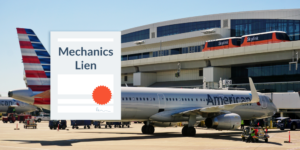
With travel set for a boom in the post-COVID era, major construction projects are already underway at some of the country’s biggest airports. Even a facelift at a major transportation hub can be incredibly complex, with costs running into the billions of dollars. So what happens when a contractor or material supplier to one of these projects doesn’t get paid? Can a contractor file a mechanics lien on an airport construction project? Just like the project itself, the answer is often complicated, and depends on a variety of factors.
Who Owns the Airport?
Whether you’re building an airport or a ski chalet, the ultimate question that determines your lien rights is: Who owns the property? If it’s privately owned, then you will typically have the right to file a lien on the property if you don’t receive payment. However, if the property is owned by a government entity, then you’ll likely need to file a claim on the bond instead.
Private vs. public airports
Everyone is familiar with the main airports in large cities, which are almost always owned by a government agency. LAX, for example, is owned by Los Angeles World Airports, an agency of the City of Los Angeles. O’Hare is owned by the City of Chicago. Construction projects on these airports will nearly always require the General Contractor to post a payment bond to protect the property from claims — and to ensure payment to subs and suppliers.
Private Airports: File a mechanics lien
Private airports — those on property owned by private individuals or companies — do not usually allow general aviation traffic. If you look at a flight map these airports have an X through them, because general traffic is not allowed.
If the airport hangar in question is on this type of private airport, owned privately and not by the government, then you are working on private land and you can file a mechanics lien on the property if you don’t get paid.
But there are thousands of airports across the country in small towns and cities, which are often referred to as “private airports” because they are infrequently used, or mostly used by “private pilots.” (I’m an private pilot, so I have a little bit of knowledge about this.)
Beware! These are not actually private airports. Regional airports are almost always owned by the city or the state, and not by a private party. Construction jobs on these airports are also considered public projects, so lien laws will not apply.
Public Airports: File a bond claim
Most airports — even small, so-called “private” airports — are actually owned by the government. Sometimes the aircraft hangars on the field are owned by the government, too, and are billed as part of a “public works project.”
When a state, county, municipal or other governmental entity commissions a project for an aircraft hangar to be built at an airport, the project is a public works project just like any other.
This means that traditional mechanics lien filings are not allowed. Instead, the general contractor will be required to post a payment bond at the start of the project and any unpaid parties will be qualified to file a bond claim against the same.
Construction on Airport Hangars & Other Leased Property
Airport hangars present an entirely unique situation. When furnishing labor or materials to an airport hangar, the furnishing is certainly incorporated into the property. That is not the issue. The issue is just what type of lien rights exists, since the airport hangar may not reside on private land. It is especially difficult to identify the project type when working on an airport.
Construction of an airplane hangar in itself can be a massive project, and ownership isn’t always readily apparent. In 2019, American Airlines built a $215 million hangar at O’Hare, the airport’s largest to date. But AA doesn’t own the land under their hangar — they lease it from the City of Chicago.
So what if a contractor is hired to work on an airport hangar by a private company? At the end of the day, the only question that really matters is: Who owns the property? In public airports, the hangars aren’t typically owned by the companies who operate out of them. Instead, the government entity owns the property and leases it to the airline or shipping company.
The ownership of the land under an airport hangar will generally determine whether a mechanics lien or bond claim is necessary. However, it’s not always cut-and-dry.
When it comes to leasehold projects like this, states differ on the lien protection they offer to construction businesses.
No claims allowed
In some states, like New York, the law simply does not allow this situation. In New York there simply isn’t any lien right or lien-like remedy for unpaid parties furnishing labor or materials to a private project on public land.
Payment bond required
Second, you may be in a state like Oklahoma, where the law specifically addresses this. In these situations, Oklahoma requires the general contractor to get a bond as if it was a state contract. Therefore, unpaid contractors and suppliers can file a bond claim if unpaid.
Lien on leasehold interest
Third, you may be in-between these other two, where the law does not disallow the lien but also does not specifically allow it. For example, under a “private lease on public land” scenario in Louisiana, a mechanics lien may actually be filed by the claimant against the tenant’s “leasehold interest” in the property. The lien, therefore, is not against the property itself, but is instead against the tenant’s rights in the property.
